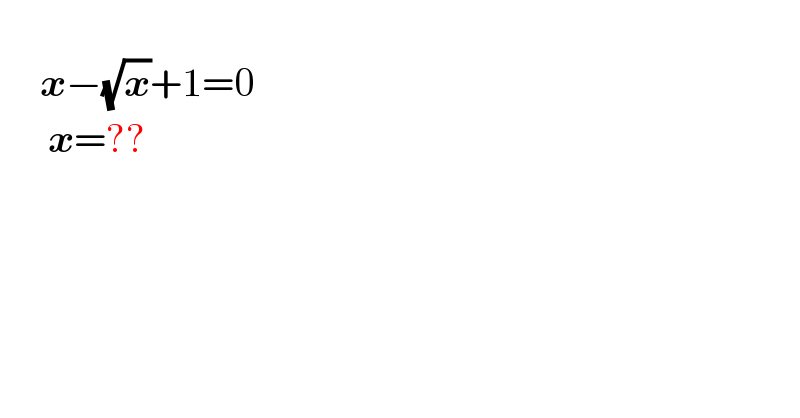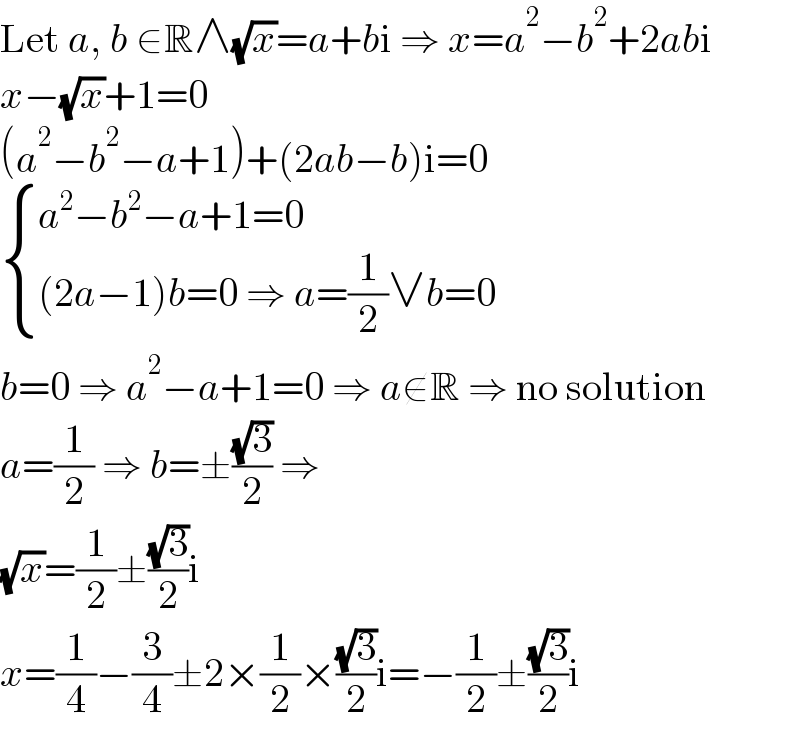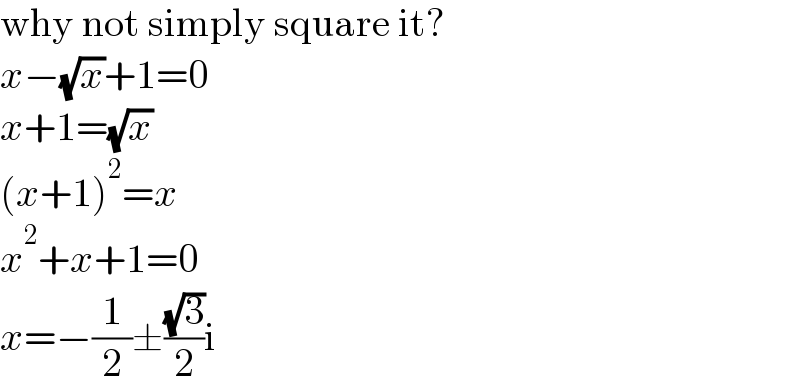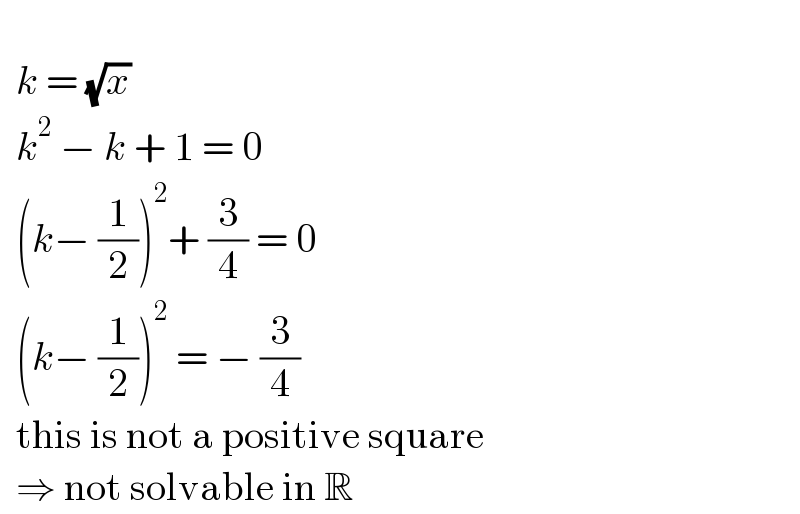
Question Number 189748 by normans last updated on 21/Mar/23

$$ \\ $$$$\:\:\:\:\:\boldsymbol{{x}}−\sqrt{\boldsymbol{{x}}}+\mathrm{1}=\mathrm{0} \\ $$$$\:\:\:\:\:\:\boldsymbol{{x}}=?? \\ $$
Commented by mr W last updated on 21/Mar/23

$${x}>\mathrm{0} \\ $$$$\sqrt{{x}}={x}+\mathrm{1}\geqslant\mathrm{2}\sqrt{{x}} \\ $$$$\mathrm{1}\geqslant\mathrm{2}\:\Rightarrow{impossible} \\ $$
Commented by Frix last updated on 21/Mar/23

$$\mathrm{Are}\:\mathrm{we}\:\mathrm{suddenly}\:\mathrm{limited}\:\mathrm{to}\:\mathbb{R}? \\ $$
Answered by TUN last updated on 21/Mar/23

$${NO}\:{ROOT}! \\ $$
Answered by Frix last updated on 21/Mar/23

$$\mathrm{Let}\:{a},\:{b}\:\in\mathbb{R}\wedge\sqrt{{x}}={a}+{b}\mathrm{i}\:\Rightarrow\:{x}={a}^{\mathrm{2}} −{b}^{\mathrm{2}} +\mathrm{2}{ab}\mathrm{i} \\ $$$${x}−\sqrt{{x}}+\mathrm{1}=\mathrm{0} \\ $$$$\left({a}^{\mathrm{2}} −{b}^{\mathrm{2}} −{a}+\mathrm{1}\right)+\left(\mathrm{2}{ab}−{b}\right)\mathrm{i}=\mathrm{0} \\ $$$$\begin{cases}{{a}^{\mathrm{2}} −{b}^{\mathrm{2}} −{a}+\mathrm{1}=\mathrm{0}}\\{\left(\mathrm{2}{a}−\mathrm{1}\right){b}=\mathrm{0}\:\Rightarrow\:{a}=\frac{\mathrm{1}}{\mathrm{2}}\vee{b}=\mathrm{0}}\end{cases} \\ $$$${b}=\mathrm{0}\:\Rightarrow\:{a}^{\mathrm{2}} −{a}+\mathrm{1}=\mathrm{0}\:\Rightarrow\:{a}\notin\mathbb{R}\:\Rightarrow\:\mathrm{no}\:\mathrm{solution} \\ $$$${a}=\frac{\mathrm{1}}{\mathrm{2}}\:\Rightarrow\:{b}=\pm\frac{\sqrt{\mathrm{3}}}{\mathrm{2}}\:\Rightarrow \\ $$$$\sqrt{{x}}=\frac{\mathrm{1}}{\mathrm{2}}\pm\frac{\sqrt{\mathrm{3}}}{\mathrm{2}}\mathrm{i} \\ $$$${x}=\frac{\mathrm{1}}{\mathrm{4}}−\frac{\mathrm{3}}{\mathrm{4}}\pm\mathrm{2}×\frac{\mathrm{1}}{\mathrm{2}}×\frac{\sqrt{\mathrm{3}}}{\mathrm{2}}\mathrm{i}=−\frac{\mathrm{1}}{\mathrm{2}}\pm\frac{\sqrt{\mathrm{3}}}{\mathrm{2}}\mathrm{i} \\ $$
Commented by MJS_new last updated on 21/Mar/23

$$\mathrm{why}\:\mathrm{not}\:\mathrm{simply}\:\mathrm{square}\:\mathrm{it}? \\ $$$${x}−\sqrt{{x}}+\mathrm{1}=\mathrm{0} \\ $$$${x}+\mathrm{1}=\sqrt{{x}} \\ $$$$\left({x}+\mathrm{1}\right)^{\mathrm{2}} ={x} \\ $$$${x}^{\mathrm{2}} +{x}+\mathrm{1}=\mathrm{0} \\ $$$${x}=−\frac{\mathrm{1}}{\mathrm{2}}\pm\frac{\sqrt{\mathrm{3}}}{\mathrm{2}}\mathrm{i} \\ $$
Commented by mathocean1 last updated on 21/Mar/23

$${S}=\varnothing\:\left({because}\:{of}\:\sqrt{{x}}\:,\:{x}\:\in\:\mathbb{R}^{+} \right) \\ $$$$ \\ $$
Commented by MJS_new last updated on 21/Mar/23

$$\mathrm{the}\:\mathrm{question}\:\mathrm{does}\:\mathrm{not}\:\mathrm{say}\:``{x}\in\mathbb{R}'' \\ $$$$\mathrm{obviously}\:\mathrm{we}\:\mathrm{can}\:\mathrm{solve}\:\mathrm{it}\:\mathrm{in}\:\mathbb{C} \\ $$
Commented by talminator2856792 last updated on 22/Mar/23

$$ \\ $$$$\:\:{k}\:=\:\sqrt{{x}} \\ $$$$\:\:{k}^{\mathrm{2}} \:−\:{k}\:+\:\mathrm{1}\:=\:\mathrm{0} \\ $$$$\:\:\left({k}−\:\frac{\mathrm{1}}{\mathrm{2}}\right)^{\mathrm{2}} +\:\frac{\mathrm{3}}{\mathrm{4}}\:=\:\mathrm{0} \\ $$$$\:\:\left({k}−\:\frac{\mathrm{1}}{\mathrm{2}}\right)^{\mathrm{2}} \:=\:−\:\frac{\mathrm{3}}{\mathrm{4}} \\ $$$$\:\:\mathrm{this}\:\mathrm{is}\:\mathrm{not}\:\mathrm{a}\:\mathrm{positive}\:\mathrm{square} \\ $$$$\:\:\Rightarrow\:\mathrm{not}\:\mathrm{solvable}\:\mathrm{in}\:\mathbb{R} \\ $$
Commented by MJS_new last updated on 22/Mar/23

$$\mathrm{yes}.\:\mathrm{but}\:\mathrm{remember}\:\mathrm{Descartes}\:\:\mathrm{introduced} \\ $$$$\sqrt{−\mathrm{1}}=\mathrm{i}\:\mathrm{back}\:\mathrm{in}\:\mathrm{1637} \\ $$
Commented by Frix last updated on 22/Mar/23

$$\mathrm{Be}\:\mathrm{patient},\:\mathrm{it}'\mathrm{s}\:\mathrm{been}\:\mathrm{only}\:\mathrm{386}\:\mathrm{years}... \\ $$
Commented by mathocean1 last updated on 27/Mar/23

$${I}\:{was}\:{saying}\:{that}\:{because}\:{it}'{s}\:{often} \\ $$$${said}\:{that}\:{the}\:{character}\:``\sqrt{\:}''{is}\:{used} \\ $$$${only}\:{for}\:{positive}\:{real}\:... \\ $$
